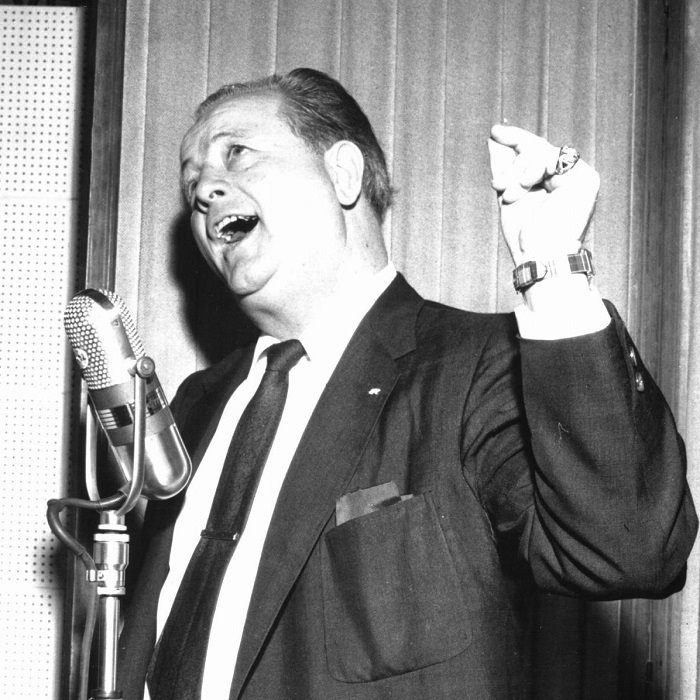Single Releases  view
view
 1949 - Hush Little Darling / Git Along
1949 - Hush Little Darling / Git Along
 1931 - When You're Lover Has Gone / Please Don't Talk About Me When
1931 - When You're Lover Has Gone / Please Don't Talk About Me When
 1929 - Carolina Moon / I Wish I Had Died in My Cradle (Before I Gre
1929 - Carolina Moon / I Wish I Had Died in My Cradle (Before I Gre
 1928 - The Lonesome Road / Wake Nicodemus
1928 - The Lonesome Road / Wake Nicodemus
 1928 - Sonny Boy / She's Funny That Way
1928 - Sonny Boy / She's Funny That Way
 1928 - Ramona / Girl of My Dreams
1928 - Ramona / Girl of My Dreams
 1927 - My Blue Heaven / Are You Thinking of Me To-Night?
1927 - My Blue Heaven / Are You Thinking of Me To-Night?
 1926 - Someday Sweetheart / Forgive Me
1926 - Someday Sweetheart / Forgive Me
 1926 - Ya Gotta How to Love / Bye Bye Blackbird
1926 - Ya Gotta How to Love / Bye Bye Blackbird
 1925 - Five Foot Two Eyes of Blue / Sleepy Time Gal
1925 - Five Foot Two Eyes of Blue / Sleepy Time Gal
 1925 - Everything Is Hotsy Totsy Now / Yes Sir, That's My Baby
1925 - Everything Is Hotsy Totsy Now / Yes Sir, That's My Baby
Members
1 Male
Origin
 Gainesville, American
Gainesville, American
Genre
 Jazz
Jazz
Style
---
Mood
---
Born
1 Male
Origin
Genre
Style
---
Mood
---
Born
1900
Active 1924 to
![]() 1972
1972
Cutout![]()
No loved tracks found...
Artist Biography
Available in:
Lemeul Eugene Lucas (June 24, 1900 – January 24, 1972), better known by his stage name Gene Austin, was an American singer and songwriter, one of the first "crooners". His recording of "My Blue Heaven" sold over five million copies and was the largest selling record of all time. His 1920s compositions "When My Sugar Walks Down the Street" and "The Lonesome Road" became pop and jazz standards.
Gene Austin was an important pioneer crooner whose records in their day enjoyed record sales and the highest circulation. The Genial Texan ex-vaudevillian and would-be screen idol, Austin constitutes an underrated landmark in popular music history. He made a substantial number of influential recordings including a string of best-sellers. Some of his best sellers include "The Lonesome Road", "My Blue Heaven", "Riding Around in the Rain", and "Ramona". At the peak of his career Austin demanded that the pianist Fats Waller alone could provide accompaniment on his records.
By 1924, Austin was in New York's Tin Pan Alley. His first recording was surreptitiously providing the vocals for the Tennessee guitarist George Reneau, whose own voice did not record well.
In 1925, Austin recorded his popular song "When My Sugar Walks Down the Street" for the Victor Talking Machine Company in a duet with Aileen Stanley. Nathaniel Shilkret, in his autobiography, describes the events leading to the recording. He followed it that year with hits including "Yearning (Just for You)" and "Yes Sir, That's My Baby. In the next decade with Victor, Austin sold over 80 million records.
His 1926 "Bye Bye Blackbird" was in the year's top twenty records. George A. Whiting and Walter Donaldson's "My Blue Heaven" was charted during 1928 for 26 weeks, stayed at No. 1 for 13, and sold over five million copies. It was awarded a gold disc by the RIAA. Until Bing Crosby's "White Christmas" replaced it, it was the largest selling record of all time. In the hope of duplicating the success, this was quickly followed by "Ramona", an L. Wolfe Gilbert-Mabel Wayne song created for the 1927 romantic adventure film Ramona with Dolores del Río. It charted for 17 weeks, was No. 1 for eight and easily topped a million in sales. It also gained gold disc status. His next success, Joe Burke and Benny Davis' 1928 song "Carolina Moon" was on the charts 14 weeks, with seven weeks at No. 1. The depression struck during Austin's hit-making years, severely damaged the recording industry and, with it, Austin's recording career.
Despite never learning to read or notate music, Austin composed over 100 songs. His compositions included "When My Sugar Walks Down the Street", recorded by Duke Ellington, Nat King Cole, The Ink Spots, Hot Lips Page, Johnny Mathis, The Four Freshmen, Red Nichols' Five Pennies, Ella Fitzgerald, Sy Oliver, and the Wolverines Orchestra; "How Come You Do Me Like You Do?", recorded by Fletcher Henderson and His Orchestra, Gene Rodemich, Marion Harris, George Wettling, and Erroll Garner; "The Lonesome Road", written with Nat Shilkret, recorded by Bing Crosby, Fats Waller, Louis Armstrong, Eddy Arnold, Don Gibson, Mildred Bailey, Les Paul, Judy Garland, Frankie Valli and the Four Seasons, Sammy Davis, Jr., Dick Dale, The Fendermen, Frank Sinatra, Chet Atkins, Bobby Darin, Duane Eddy, Paul Robeson, Jerry Vale, Muggsy Spanier, Tommy Dorsey, Benny Goodman, Jimmie Lunceford, Frankie Laine and Ted Lewis; "Riding Around in the Rain", written with Carmen Lombardo and "The Voice of the Southland".
Austin formed a trio with bassist Johnny Candido and guitarist Otto Heimel. They called themselves "Gene Austin and his Candy and Coco". They had a radio series from 1932 to 1934.
Colonel Tom Parker, who later became Elvis Presley's manager, gradually worked his way into the music business when he began to promote Gene Austin in 1938.
Wide Thumb
Clearart
Fanart

Banner
User Comments
 No comments yet..
No comments yet..